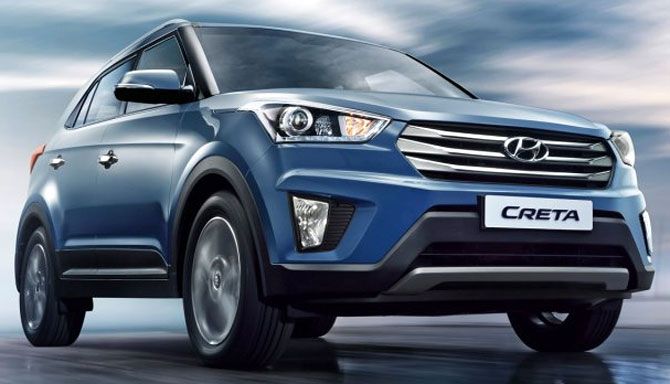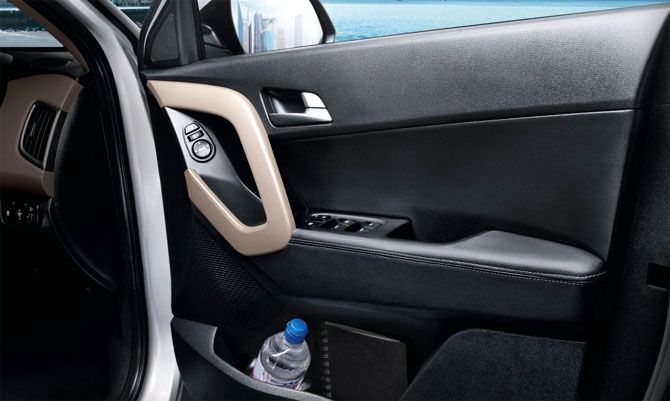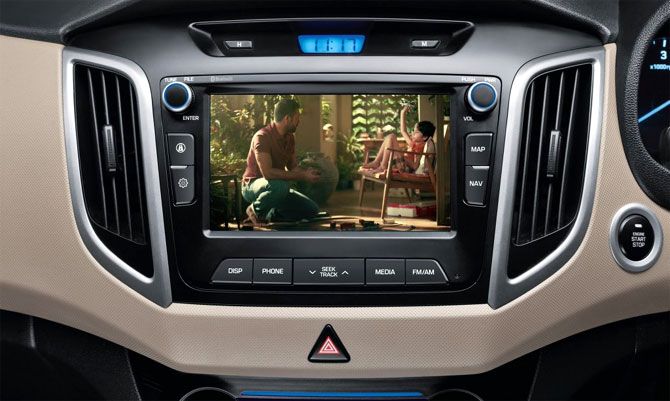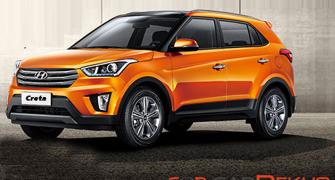The SUV leaves a good impression thanks to its athletic built

Hyundai has finally entered the compact SUV segment with the new Creta. Ever since Renault pioneered with Duster in 2012, the automakers in India have been vying to bring in a compact SUV to encash on the growing preference for the new age cars that offer comfort of a sedan and get great features inside. Scrutinising Creta, it seems Hyundai has indeed done a great job. Creta is a winner in terms of looks and delving deep into the knick-knacks of the SUV only reveals how well it is juxtaposed against its rivals.

The SUV leaves a good impression thanks to its athletic built. Appearing relatively larger than rivals in the segment, the compact SUV gets puffed-up dimensions. That said, Creta measures 4,270 mm long, 1,780 mm wide and 1,630 mm high. The 2,590 mm long wheelbase insinuates pompous cabin space. With these dimensions, Creta will definitely overpower the upcoming S-Cross from Suzuki which gets relatively soft exterior. Featuring Hyundai’s Fluidic Design Sculpture 2.0 language, traces of other Hyundais are visible on the outside specially Santa Fe, hence Creta is also being called the baby Santa Fe.

The long bonnet is complimented well by the up-right three slat chrome grille placed horizontally. Projector head lamps with integrated LED daytime running lights flank the front radiator grille. The wide dual tone front bumper gets fog lamps and air intakes. An under spoiler is also placed in the front, the black cladding all around the SUV and the black sash tape around the window impart sporty character to the exteriors.

Seventeen-inch diamond cut alloy rims come with the 215/60 R17 tyres (exclusive to top-end trim). Power adjustable body coloured ORVMs get integrated turn indicators, the prominent character line accentuates side profile.'
Go to the rear and the first thing you notice is Elite i20 inspired tail lights, besides, it gets reflector, a narrow chrome band above the license plate and incorporated rear spoiler. Chrome outside door handles are again restricted to the high-end trim while the rest get body coloured door handles.

The 2,590 mm wheelbase offers generous space in front as well as the rear, head room, leg room and shoulder space are lavish. However the high window line makes the rear seats appear low and enable restricted view from the back. The diesel automatic SX+ variant features leather wrapped gear shift. Fabric upholstered seats are standard across variants except for the top-end grade which gets leather covered seats. Front and rear seats get adjustable head rests for the convenience of occupants.

Interiors have been styled in a chic fashion with a modish dual tone dashboard dominated by the beige colour. The centre console sports a five-inch touch screen in mid-level trims and an exquisite 7-inch touchscreen in high-end variant is placed on the centre console. Just beneath the touch screen, buttons for climate control are placed. Storage space like front and rear map pockets are also there.

Vital features include keyless entry, power windows in front and rear, height adjuster for drivers’ seat, steering mounted controls for audio system and Bluetooth, audio-video navigation, smart key with push button, dual airbags, side and curtain airbags, ABS, speed sensing auto door locks, rear parking camera with guidelines, rear parking sensors, impact sensing auto door unlock and electronic folding ORVMs among others.

Hyundai Creta range includes two diesel engines and one petrol, the diesel line-up gets a 1.4 litre CRDi diesel engine set in lower grades including L, S and S+. While the 1.6 litre CRDi motor is employed in high-end grades such as SX, SX+ and SX (O) trims. Petrol variants run on a 1.6 litre VTVT petrol engine powering the L, S and SX+ variants. In terms of power generations, the 1.4 litre CRDi engine pumps out 90 PS along with 220 Nm. Moving on to the 1.6 litre CRDi, this engine can pull off 128 PS and 260 Nm. The only petrol engine in the line-up is tuned to yield 123 PS along with 151 Nm.

Transmission on offer includes one manual and one automatic gearbox, the six-speed manual tranny is standard across grades in the Creta line-up, whereas the automatic gearbox is linked to just one diesel trim christened SX+. The auto box equipped in SX+ is a six-speed automatic transmission, what makes this special is the fact that Hyundai is pioneering with this tranny in compact SUV segment.

For a vehicle to be well received in India, it has to have frugal enough to impress the masses. Lower the running cost, higher is the preference for that vehicle. As for Hyundai’s new Creta compact SUV goes, it promises to deliver decent run on the road in one kmpl. Diesel variants for obvious reasons are claimed to return more mileage than the petrol trims.
That said, the 1.4 litre diesel manual grades are tuned to run up to 21.38 kmpl while the 1.6 litre manual trims can return 19.67 kmpl and 1.6 litre automatic trim can yield 17.01 kms in a litre. Petrol powered Creta on the other hand is supposed to deliver ARAI rated fuel economy of 15.29 kmpl.
Creta's biggest rivals are Renault Duster, Ford EcoSport, Nissan Terrano and the upcoming Maruti Suzuki S-Cross. Hyundai has priced Creta a tad higher than Duster. The company is confident that the stylish looking Creta will be able to outpace rivals in the number game.
Creta petrol line-up is priced between Rs 859,000 to Rs 11.20 lakh, diesel manual range begins at Rs 11.60 lakh and goes up to Rs 13. 60 lakh. The 1.6 litre diesel automatic variant is available at Rs 13.57 lakh (ex-showroom Delhi).
Powered by 
Autoportal.com is a unique attempt to bring together a comprehensive platform to watch, learn and explore about the car industry from the well researched and updated content..







